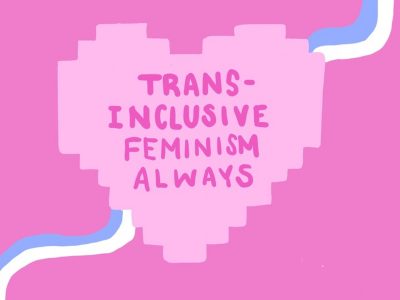Feminism is founded on the principle of intersectionality — women of all demographics united under the quest for equality.

But some believe feminism should neither be inclusive nor intersectional.
Trans-exclusionary radical feminists (TERFs) or gender-critical feminists ascribe to a creed that only applies to cisgender women.
They co-opt feminist verbiage and concepts. They advocate for the empowerment and equality of women and then turn around to invalidate and exclude transgender women.
It’s transphobic. It’s hypocritical. And it’s most definitely not feminism.
Gender can be considered as an expression or identity, whereas sex is an assigned biological classification of male or female. TERFs argue that trans women aren’t genuine women because biologically, their sex isn’t female. But hear me out: A binary categorization of sex is impossible.
Look at intersex people, whose sex chromosomes and sexual anatomy don’t correspond with each other — in other words, they don’t fit in the binary of male or female.
Some estimates claim that as many as one in every 100 people are intersex. In rare cases, people with XY chromosomes can live their whole lives as male — even fathering children — without ever realizing that they have a uterus (a condition known as Persistent Müllerian duct syndrome.)
Faced with so many counterexamples, it’s clearly not true that XX chromosomes always mean female and XY always means male.
In fact, newer research indicates an even more complex system, wherein cells, receptors, hormones, enzymes, gene expression and a myriad of muddled factors play into what we oversimplify as “sex assigned at birth.” There are many such cases where a woman has cell DNA that is genetically male, or vice versa.
As is consistently reported by genetics experts, understanding sex as a binary is not only convoluted but also erroneous.
Besides biology, TERFs argue that trans women lack the experiential womanhood that is characteristic of cis women. They suggest that all of us women have some intangible, innate, shared womanness, “just girly things,” if you will.
This concept is speculative at best.
In actuality, women have very different experiences. Factors like a woman’s race, nationality or sexuality can significantly impact her lived experience. Although they may share many similarities, a Black woman’s experience is not the same as a white woman’s, a lesbian’s is not the same as a straight woman’s and so on.
Equating these all to some reverent womanness downplays and outright ignores the bigger picture — all the racial, socioeconomic, political, ethnic, marital, age, educational and you-name-it aspects that shape our lives.
In fact, individual differences are what make every woman unique, and allow us to learn from others’ perspectives and experiences that we may not have had ourselves.
Womanhood is a journey that takes many paths, a shape with many forms. To shrink it to the same thing loses the purpose of a collective movement. The exclusion of trans women, based on the notion of a singular “womanhood,” is harmful to everyone.
Part of the TERF narrative is that trans women have not had the same womanly struggles as cis women. In truth, trans women are more likely to face higher rates of discrimination, harassment, housing insecurity, hate crimes and violence.
Trans people are four times more likely to experience violence and assault. The number of trans murders nearly doubled between 2017 to 2021.
TERFs’ continued exclusion of trans women only perpetuates this cycle of transphobia and violence. It’s not just a difference of ideological opinion — lives are quite literally at stake. TERFs’ discrimination of trans women is just another iteration of white women discriminating against Black women, or upper-class women exploiting lower-class women. Women discriminating against women is the antithesis of feminism.
The hypocrisy of it all is actually quite shocking. The gender binary that TERFs enforce is the very thing that feminism has been fighting to dismantle.
Gender essentialism — the idea that there are intrinsic qualities of men and women — has long been criticized as a means of establishing gender roles and oppressive systems.
This sexist logic indicates that women are inherently emotional, homemakers or submissive, as a fact of their gender. Yet this is the same logic TERFs use — women have an inherent womanness, femininity or purpose of bearing children.
The main issue lies in the idea that there is anything “inherent” to be a woman.
If we want to progress past age-old stereotypes and prejudices, we have to abandon preconceived notions of sex and gender.
We must celebrate our differences, embrace free expression and respect each other’s autonomy of identity — no woman left behind.














